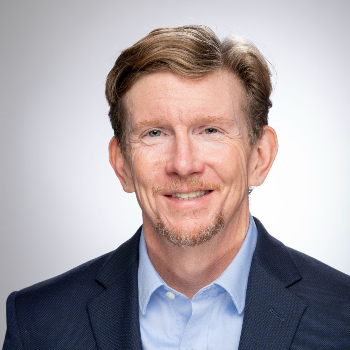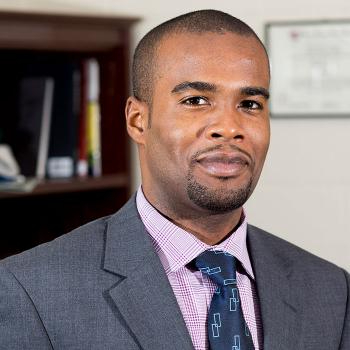by Jenna Somers
Professor of Public Policy and Education Thomas Smith and Associate Professor of Education and Public Policy Richard O. Welsh joined the Department of Leadership, Policy and Organizations at Vanderbilt Peabody College of education and human development this fall. Smith returns to Vanderbilt from the University of California, Riverside, where he held multiple leadership roles in academic administration for eight years. From 2001–14, he held assistant and associate professorships at Peabody. He earned his doctorate in educational theory and policy from Pennsylvania State University. Welsh was previously assistant professor of educational leadership and policy studies at New York University and assistant professor of educational administration and policy at the University of Georgia. He earned his doctorate in urban education policy from the University of Southern California.
Thomas Smith
Thomas Smith has worn several hats in education: statistician for the federal government, professor and academic administrator. As he returns to Peabody College, he is excited to bring his expertise from previous roles to his collaborations with PEER and Peabody colleagues and to his teaching at the undergraduate, professional and doctoral levels.
“The opportunity to improve student learning outcomes and education equity through engagement with PEER drew me back to Peabody,” Smith said. “I am working closely with several Peabody faculty members in research-practice partnerships, including new faculty member Jennifer Russell. She and I are part of a PEER working group looking to improve instruction in literacy/English, language arts and mathematics, and we are excited to pursue projects aimed at disrupting inequalities in Metro Nashville Public Schools.”

For 10 years Smith worked on statistics for policy at the U.S. Department of Education, the Organisation for Economic Co-operation and Development and the National Science Foundation. He developed education indicators for policymaking, and this experience taught him important lessons about how policies are developed and how data can be used to support policy development.
Those lessons initially informed Smith’s approach to research when he first joined Peabody in 2001 as an assistant professor of public policy and education. While he had wide latitude as a professor to choose what he studied, his prior experience in government working with large datasets on policy-relevant issues oriented him to research that would have the greatest direct benefit on the work of teachers and students.
That mindset led Smith to pursue research-practice partnerships. The Middle School Mathematics in the Institutional Setting of Teaching (MIST) was one of Smith’s first research-practice partnerships, a more than decade-long collaboration with Paul Cobb, research professor in math education in the Department of Teaching and Learning, and several large urban school districts. They analyzed the districts’ systems for instructional improvement, policies and practices, professional development and coaching for teachers, principals’ expectations of teachers, and whether those aligned with instructional improvement opportunities. They conducted interviews, observed classroom instruction and provided feedback annually to district leaders, as well as guidance based on research literature to improve instructional outcomes. This work led to multiple articles and the publication of a book, Systems for Instructional Improvement: Creating Coherence from the Classroom to the District Office.
Midway through the MIST collaboration, Smith and colleagues in the Department of Leadership, Policy and Organizations started the National Center for Scaling Up Effective Schools, another influential research-practice partnership, with support from the Department of Education. Directed by Smith, the center collaborated with five universities, two school districts and the Education Development Center to identify practices within the school districts that were improving student achievement, increasing graduation rates and closing achievement gaps. They then worked with teachers and school leaders to build programs and interventions to transfer these practices to schools that were not performing well. Marisa Cannata, associate professor of the practice, took on the role of director after Smith became dean of the Graduate School of Education at the University of California, Riverside.
For eight years Smith held leadership roles in academic administration at UC Riverside, including dean of the school of education, interim vice chancellor of student affairs, interim provost and executive vice chancellor, and special adviser to the chancellor.
“As an administrator, I got a chance to apply some of my research and the research of colleagues in the field to leading a school of education and teacher education program, and then ultimately to leading the academics at a university,” Smith said. “Being able to take what I learned and put it into practice was quite rewarding. Now I get the opportunity to focus on research and teaching again, and to use the knowledge I’ve acquired in all these different roles in my own teaching practices as well as to my engagement in PEER.”
Richard Welsh
Throughout Richard Welsh’s career, his research has centered on understanding and disrupting inequality in K-12 education—leveraging frameworks from economics, political science and sociology to better understand the mechanisms of inequality, such as student mobility and school discipline. He also has examined policies and practices intended to advance educational equity.
“I am very driven by how we can improve the experiences, opportunities and outcomes for marginalized and underrepresented students and ultimately change the trajectory of their lives,” Welsh said. “I measure the impact of my work based on whether it supports educators doing the important work in the classrooms.”

Welsh has collaborated with schools and districts throughout the U.S., including in post-Katrina New Orleans, Georgia and New York City. He has examined the importance of student mobility on educational opportunity; the politics of state takeover of “failing” school districts; the influence of interest groups on school board elections and education reforms; and in a current study, disparities in students’ disciplinary outcomes, where students of color are punished at disproportionally higher rates.
Welsh is using data from New York City schools to better understand the root causes of these discipline disparities, including school-level factors, such as school climate and the diversity of school personnel. He also is interested in the effectiveness of alternative approaches to exclusionary discipline, such as restorative justice, which seeks to repair harms through inclusion and mediation; positive behavioral interventions and supports; and asset-based approaches, which focus on schools’ strengths in their approach to school discipline rather than their inadequacies. By identifying and examining states, districts and schools that are beating the school discipline odds, Welsh hopes to shift the deficit-oriented paradigm on school discipline and uncover the essential ingredients of how schools produce low rates of suspensions and reduce discipline disparities.
In a recent study published in the Peabody Journal of Education issue “The Politics of COVID-19 and Educational Inequities,” Welsh investigated disparities in school discipline within the context of the COVID-19 pandemic. This study found that during each school year of the pandemic (2019–20, 2020–21 and 2021–22), disciplinary practices and patterns varied, with exclusionary measures reduced during remote learning but increased once students return to campus. Even while suspensions declined dramatically during the largely virtual 2020–21 school year, Black students and those with disabilities disproportionally received exclusionary discipline. According to Welsh, however, the data also reveals more disciplinary restraint than anecdotal reporting suggests.
“Some of the empirical data reveals greater complexity than simply stating higher discipline referrals and suspensions are a result of students having difficulty re-socializing back into in-person learning,” Welsh said. “The increase in exclusionary discipline wasn’t as dramatic as you might expect. I think this indicates greater use of some of the non-exclusionary strategies, such as student and parent conferences. So, to my mind, even though it was a year of challenges, it might also have been a year of tremendous empathy on the part of educators. It could also be that the message of shifting away from exclusionary discipline is starting to take hold. I think there is more to learn as we continue to collect data on this past school year.”
Collaborating with Metro Nashville Public Schools through the Partnership for Educational Equity Research is Welsh’s next major project and the reason he is most excited to join Peabody College. Research-practice partnerships and translating research into improved outcomes for students are foundational elements of Welsh’s research agenda.
“I want to be a thought partner to help districts tackle their most urgent challenges to advance educational equity,” Welsh said, “and I would like to see our work in PEER become an exemplar for urban districts nationally, as we work to disrupt educational inequities.”